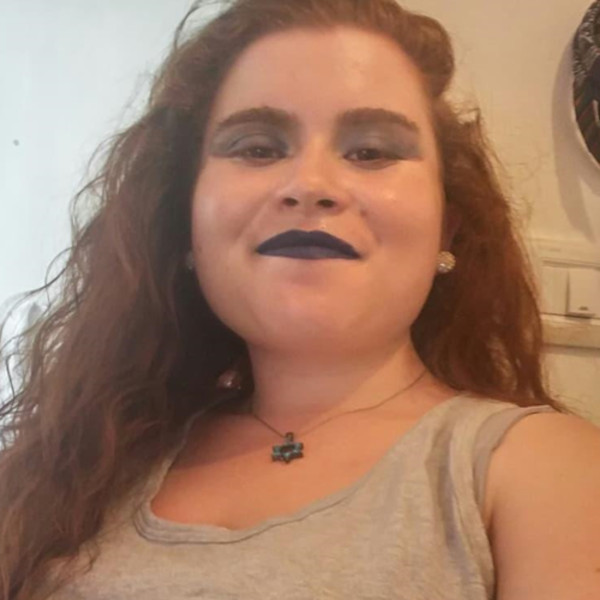Interviews with Olim
Each month, we interview an oleh or olah for our newsletter.
We invite you to read the stories of LGBTQ+ people who have made Israel their home.
"I really believe in the Zionist ideals"
Interview date: January 2020
Q. Where were you born and where did you grow up?
A: Toronto born and raised! The city has both thriving queer and Jewish communities, and a pretty great intersection thereoff.
Q. At what age did you come out? And how did it go?
A: I came out over the course of high school and the first few years of college. I went to a Performing Arts program in high school and was in a group of friends who were all figuring out they were different shades of queer together, so it was less coming out and more collectively coming to terms. I told my parents and family as it came up and it went pretty well each time.
I remember my cousins from Chicago, who are a little more Modern Orthodox, were in town for American Thanksgiving and we had this big family Shabbat dinner. My cousins were talking about being on Jewish dating apps, and I said, casually, that as hard as it is to find fellow Jews on the ‘secular’ apps, there’s not a lot of queer women on the Jewish ones, and I don’t date men online. There was a brief pause, and then the conversation continued. No one was shocked that Toby’s the weird gay cousin!
Q. Were you involved at all in the LGBT community back home?
A: Somewhat! I’m not that social in general, to be honest. But most of my close friends are queer, and I tried to stay involved. After my shnat sherut (pre-army year) here in Israel, I did a show with the Emerging Artists program at Toronto’s LGBTQ Theater, Buddies in Bad Times. I particularly tried to show up for queer Jewish events. There were a few Pride Shabbat dinners and I volunteered at Kulanu‘s booth (that’s Toronto’s Jewish LGBTQ organization) at Pride.
Q. What is your involvement (if any) in the LGBT community in Israel?
A: Mostly LGBT Olim stuff! I was living in Haifa my first year after I made aliyah and I went to a handful of Qulpan sessions there and some English-Speakers Group events at the Communities House (shoutout to Shani Shulman for spearheading that stuff!). I went to Pride in Haifa and in Tel Aviv.
Now that I’m in Jerusalem I’m trying to get involved. Attending Qulpan here, going to a few events. Getting myself out of the apartment and willing to socialize is always my biggest barrier, but when I have the energy, being with other queer Jews is always my favourite place.
Q. How long since you made Aliyah?
A: A year and 2 months ago!
Q. Did you move here on your own or with family/friends/significant other?
A: I moved here with a group of friends from my Youth Movement in North America. We split ways recently, so I’m on my own now.
Q. Why did you make Aliyah?
A: Whooooo, that’s The Question, huh. As I said, I came here with friends from my Youth Movement, and I came to make a difference and help people. I really believe in the Zionist ideals, those of the early Kibbutzniks – an equal and just Jewish society that is at peace with its neighbours and is fair to the minorities in its midst. I wanted to work towards those ideals as an educator and a madricha, but there just wasn’t a place for me in that structure for a lot of reasons. Now, I’m in Jerusalem and I’m going to be studying at the Pardes Institute, which is something I’m really excited for, but what I do after that, I’m really not sure.
I still believe in those ideals and I still want to work towards making Israel a better place for everyone, I’m just not sure how to do that in a way that keeps me happy and healthy right now.
Q. How is it going so far?
A: It’s hard! No one told me otherwise, but it’s still hard. I came here to do one thing and that didn’t work out. Now I’m trying something else, but it’s temporary. I really don’t know what comes next.
Q. What do you do in terms of work?
A: I babysit and nanny mostly, childcare and informal education are the only skills I have that make any money, and I like hanging out with kids and being a mentor.
Q. How is your Ivrit?
A: I’m still working on it. I went to 8 years of private Jewish school and I did my gap year here in Israel, so I came with a basis and I went to Ulpan. I can get around and do my errands okay, and I can have a more in-depth conversation if the other person is patient with me. I try to practice on Duolingo and keep learning.
Q. What has been your biggest challenge so far?
A: Language is obviously a big barrier, but really it’s been figuring out how to feel Jewish here. It’s a transition, growing up with your central identity being a minority, to coming to a place where it’s the default. Weirdly, it can be harder to make time to practice Judaism in meaningful ways here than in the Galut.
Q. How do you perceive the Israeli LGBT community?
A: I don’t know it that well, but I think there’s a lot of good in it. I see a lot of solidarity, a lot of people finding community and fighting for justice and I think that’s wonderful. What worries me, and this is about progressive and lefty Israelis in general, not just the LGBTQ ones, is the rejection of Jewish culture and identity. I get why. A lot of times Judaism, as strictly a religion (which it simply is not), is associated with hard right ideology and policy here, and people who want to oppose that feel like they have to push away all the wonderful spiritual, religious and cultural parts of Judaism as well. I think a lot of good could come of more LGBTQ and progressive Israelis embracing their Jewish identity on their terms and by their values.
Q. How is being LGBT in Israel different to back home?
A: It doesn’t feel too different for me. There are places here where it’s totally safe and accepted to be queer and places where it’s dangerous and hated and the same goes for Canada. It’s certainly an impediment that same-sex marriage isn’t allowed, but that’s more about lack of civil marriage and the Rabbinate’s control over way too much of Israeli life than it is about homophobia. Some terms have different meanings here that I have to re- or un-learn. I used ‘queer’ a lot in these answers and here that word is often about gender whereas I’m used to it as an umbrella term for non-cis/het folks.
Q. If you were making aliyah now, would you do anything differently?
A: I’m not sure I would. I’m glad I came here with the support structures I had. I wish I had done more things I wanted to, taken more opportunities to build up community and skills earlier on, but I’m trying my best to do that now. I’m just going to keep going and be open to what comes my way.
Toby

Our Newsletter
Sign up if you would like to receive a monthly email listing events of interest to LGBT English-speakers in Israel, an interview with an oleh/olah and other useful information.
Want to be interviewed?
Complete the form below and we will get back to you.
Our Newsletter
Sign up if you would like to receive a monthly email listing events of interest to LGBT English-speakers in Israel, an interview with an oleh/olah and other useful information.
Want to be interviewed?
Complete the form below and we will get back to you.


